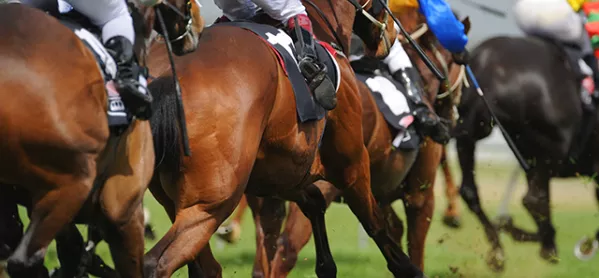I was surprised to hear the other day that they are going to run the Grand National next Saturday.
Sort of. A virtual race is being screened on ITV, featuring 40 of the most likely contenders, thanks to research on each horse, maths equations and CGI video technology.
They have been running this Algorithm Aintree for three years now, normally just as a forerunner to the real thing. It has proved impressively accurate. It predicted the winner in 2018 and identified three of the top five last year.
So let’s not look this gift-horse in the mouth. If such a predictor works for an animal as stubborn and capricious as a horse then surely it would work with even greater accuracy for GCSE and A-level students?
The exams watchdog Ofqual is currently fumbling around, trying to sort some kind of results-prediction system out for us all. The trouble is that it has no such past experience to go on. Perhaps it should instead turn to the racing formbook and the virtual Grand National algorithm for inspiration.
Coronavirus: How will Ofqual award GCSE and A-level grades?
The adjustment of the formula, from steed to student, would be incredibly easy. The criteria are more or less the same:
How many races has the horse run this season: The same as “how many lessons has the student attended?”. We commonly say: “There is a clear correlation between lesson attendance and exam performance.” The bookmaker Betfair similarly puts it: “Horse’s that can’t run the distance or lack race fitness won’t win.”
Number of falls: Another simple translation. “How many times has the student ‘fallen’ in terms of detentions, isolations, exclusions and so on?”
How many times has the horse been pulled up: Failure to complete a race is merely the equine equivalent of failing to complete homework.
Number of wins: How many times has the student gained a higher mark than anyone else in the class, or at least been in the frame?
How did the horse get on in the Cheltenham festival: A horse’s performance in the blue-riband event in the racing calendar is equivalent to how a student got on in the recent mocks.
The going: Many horses are affected by the “going” ground conditions. Some prefer it firm, some soft, some are not really fussed. Just the same for students and exam temperatures. So we need to factor in the weather on the specified day of each exam.
Form: How were they doing in their most recent ventures? Has the student been showing any signs of starting to move up the field? Or were they still being taken to the water and refusing to drink?
Turn of foot: Measures a horse’s ability to accelerate rapidly in the final couple of furlongs. We all know students who can show the same.
The chance factor: As with the Grand National, random events can affect performance on the day. Another runner might distract a horse before the race, or they may make a careless but crucial slip at one of the more crucial fences, or show poor time management and leave it too late. This level of susceptibility plainly needs to play some small part in the overall equation.
After putting suitably varying amounts of these ingredients into that same Grand National mix we would surely generate as solid a grade-prediction system as any.
Some may bridle at this idea of treating students like horses. But it’s surely what we do anyway? In fact, this algorithm version would be fairer to more of our students than the actual real-life race in the exam hall. Which says it all, really.
Stephen Petty is head of humanities at Lord Williams’ School in Thame, Oxfordshire




